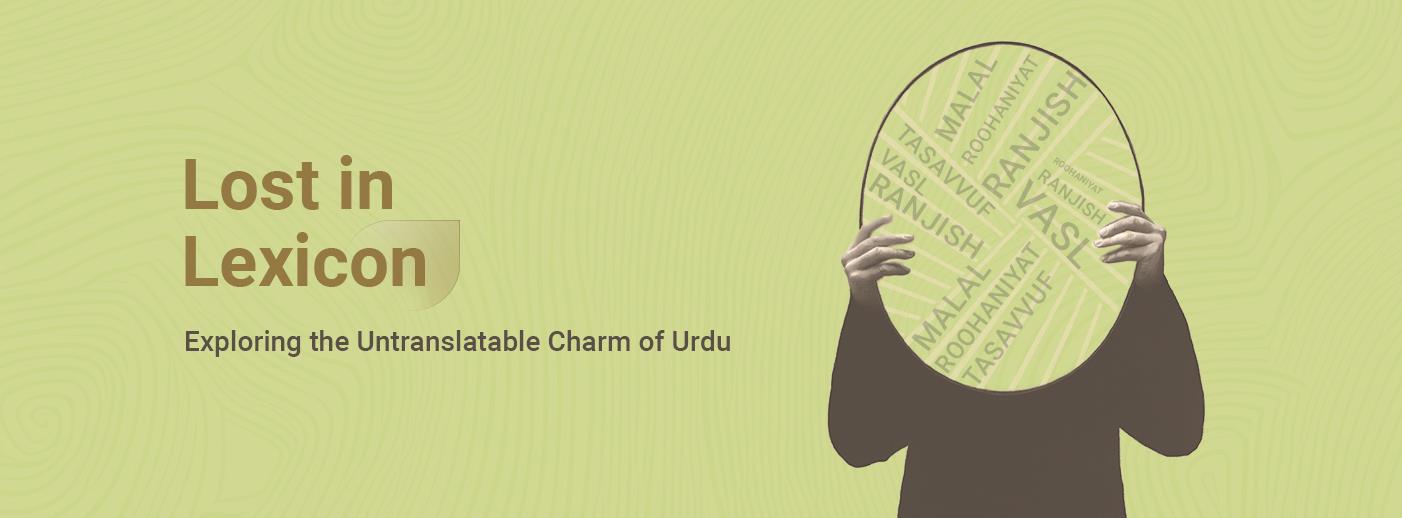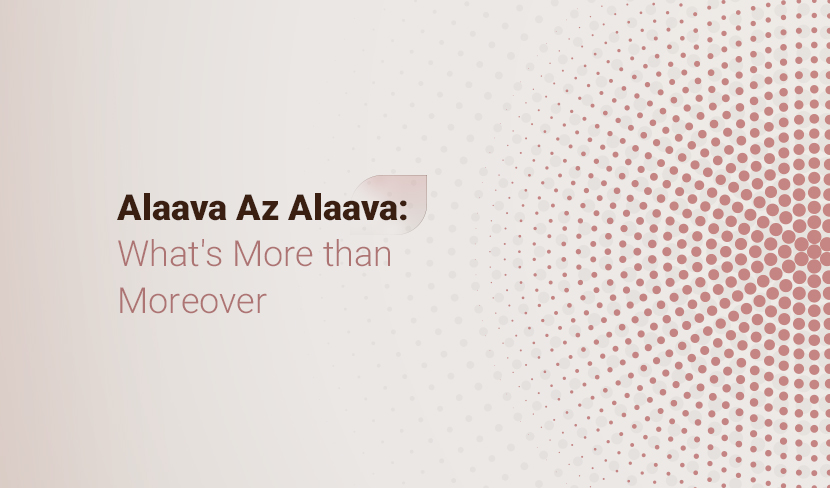अधिक खोजे गए शब्द
सहेजे गए शब्द
खिस्यानी बिल्ली खम्बा नोचे
जिसे क्रोध आ रहा हो वह अपनी खीझ या क्रोध दूसरों पर उतारता है, लाचारी में आदमी दूसरों पर क्रोध करता है, लज्जित व्यक्ति दूसरों पर अपनी लज्जा उतारता है, निर्बल की खीझ
कोशिश
कोई काम करने के लिए विशेष रूप से किया जानेवाला प्रयत्न, मेहनत, दौड़ धूप, प्रयत्न, प्रयास, चेष्टा, उद्योग, श्रम, उद्यम, उपाय, परिश्रम
आठ बार नौ त्योहार
सुख-सुविधा और आराम का शौक़ या लगन ऐसा बढ़ा हुआ है कि युग और समय उसको अल्प व्यय नहीं करने देता
चमनिस्तान
ऐसा बाग़ जहाँ फूल ही फूल हों, ऐसी जगह जहाँ दूर तक फूल ही फूल और हरा भरा नज़र आए, वाटिका, चमन, बाग़
दादरा
संगीत में एक प्रकार का चलता गाना (पक्के या शास्त्रीय गानों से भिन्न), एक प्रकार का गान, एक ताल
Lost in Lexicon: Exploring the Untranslatable Charm of Urdu

samjhi gayi jo baat hamaari ghalat to kya
yaan tarjuma kuchh aur hai aayat kuchh aur hai
This couplet penned down by Anjum Rumani encapsulates the pain of not being understood properly due to an improper interpretation of an individual’s feelings. The intricacy of this couplet puts emphasis on the fact that despite having thousands of languages across the globe, sometimes, human beings just fall short of finding a perfect word to describe their thoughts and emotions. Many people call it ‘being lost in translation’.
Dear readers, today, we’re setting off on a journey to explore the world of such Urdu words, that just cannot be translated into English, or any other language. The emotions, essence and intricacies packed in these words do not find a suitable equivalent in other languages. Ironically, we will try to explain their meanings in English, but in the heart, we know, that it’s just not possible.
So, without much delay, let us begin exploring some words and phrases which truly reserve their charm, exclusively in the beautiful landscape of Urdu.
First up we have the duo, ‘hijr’ and ‘vasl’, both of which are entire concepts within themselves. And when you ask an Urdu speaker for the meanings, you might very well get a response on the lines of ‘ah, how do I translate it?’. ‘Hijr’ is the period in which a lover anxiously waits to be reconciled with their beloved. ‘Vasl’ on the other hand is the moment of this much anticipated reunion. But, my dear readers, labeling 'hijr' as waiting and 'vasl' as reunion barely scratches the surface of the profound emotions these words convey in Urdu.
Look at this couplet of Jaun, where he talks about both hijr and vasl simultaneously to narrate how the city of the beloved has ruthlessly killed the essence of both the hijr and the vasl:
kahnii hai mujh ko ek baat aap se ya'anii aap se
aap ke shahr-e-vasl mein lazzat-e-hijr bhii gayi
To say that the poet is merely talking about unpleasant experiences of waiting and reconciliation is to degrade the intensity of the emotions portrayed. And that is why, any translation does not justify the true nature of hijr and vasl.
Then we have the word ‘roohaniyat’, radiating a mystic spell in the realm of Sufism. When translated, ‘roohaniyat’ becomes ‘spiritualism’ or ‘spirituality’. However, the term encapsulates much more than being spiritual. It is often used to denote the soul’s connection with the divine energy and a person’s complete devotion to the love for God. Reducing it to 'spiritualism' or 'spirituality' simply falls short of capturing the true essence of its divine connotations.
Another word on our list today is ‘ranjish’. In the dictionary, you will find it being translated as ‘indignation’ or ‘grief’ or even as ‘estrangement’. However, ranjish is more than just a strained equation with a loved one. It surpasses the domains of being sad or feeling left out. In Urdu, ranjish is the throbbing of a heart in despair. Just imagine the agony of Ahmad Faraz’s verse, and see for yourself, if any of the translations can match up to the real sentiment:
ranjish hi sahi dil hi dukhane ke liye aa
aa phir se mujhe chhod ke jaane ke liye aa
A common terminology used in Urdu literature, especially in Urdu poetry is ‘rashk-e-qamar’. Attempts at translation reached a point where we had to settle to call it ‘the envy of the moon’, but any true Urdu enthusiast would would probably smirk at how straightforward that sounds. All the love and admiration for a beloved, in a lover’s eyes cannot be described in any translated form.
Marasim, our show stopper for today is an untranslatable gem. And that is because the English translations ‘customs’, rule, regulations, etc. just do not fit with what depths of its meanings actually holds. Marasim is often used in the sense of being acquainted with someone, or being known to someone. Look at this couplet by Ahmad Faraz, and try to comprehend the meaning of 'marasim' on your own, and you'll figure out why the translation doesn't match up:
ab aur kyaa kisii se maraasim badhaayein ham
ye bhii bahut hai tujh ko agar bhuul jaayein ham
You might now understand that it is not merely about connections and relations. It goes beyond, and deals with the concept of attachment of hearts.
And there you have it, dear readers, that wraps up our language journey for today. We hope you understood how some feelings simply defy expression in 'other words'. Stay connected as we'll be unveiling yet another collection of linguistic marvels soon. Until then, keep the curiosity alive and the love for language burning!
Delete 44 saved words?
क्या आप वास्तव में इन प्रविष्टियों को हटा रहे हैं? इन्हें पुन: पूर्ववत् करना संभव नहीं होगा





